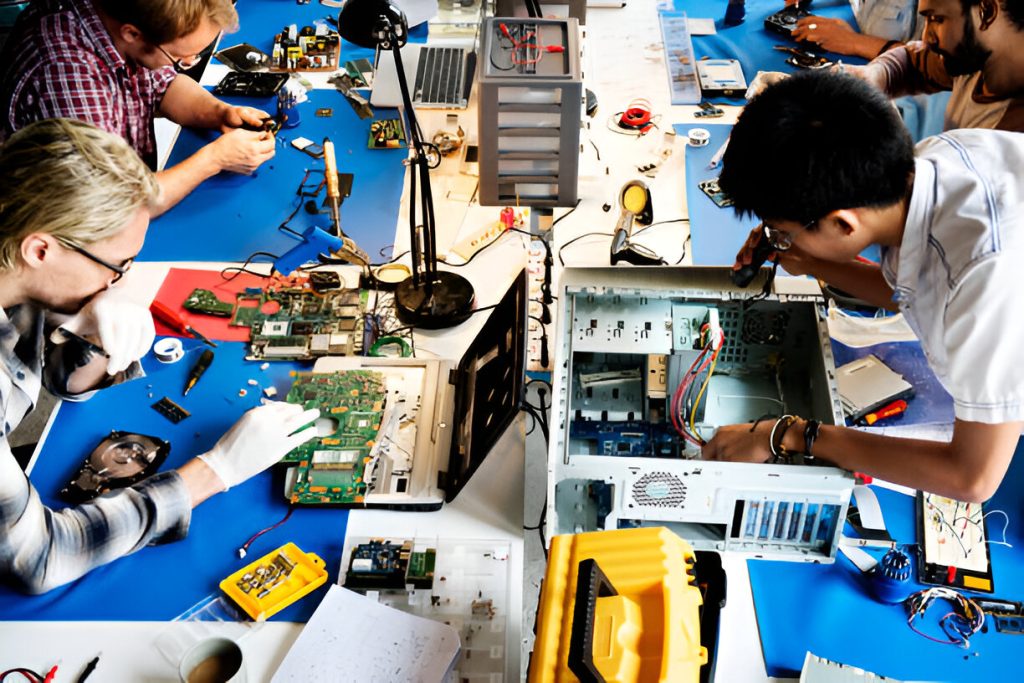Plumbing is one of the most hands-on and rewarding careers today. Whether you want to work for a company or start your own business, getting the right training is the first step. If you’re thinking about how to succeed in your plumbing school program, this guide is here to help.
Plumbing school teaches you important skills like installing pipes, reading blueprints, fixing leaks, and following safety rules. But just going to class is not enough. You need a plan, strong habits, and the right attitude to truly succeed.
This guide will walk you through everything you need to know to get the most out of your plumbing training and get ready for a successful career.
1. Know What to Expect in Plumbing School
Plumbing school programs include classroom lessons and hands-on training. Some schools offer short certificate courses, while others offer two-year diploma programs.
| Type of Learning | What It Includes |
| Classroom lessons | Math, safety codes, system design |
| Hands-on practice | Using tools, installing pipes, fixing leaks |
| Exams | Written and practical tests |
| Certifications | May prepare you for state licensing exams |
Plumbing school isn’t just about using tools. You also learn how to follow building codes, read blueprints, and solve problems safely.
2. Choose the Best Plumbing Program for You
Not all plumbing schools are the same. To succeed, choose one that fits your needs.
Look for these features:
- Accredited by a known body
- Offers hands-on workshops
- Has experienced teachers
- Helps with job placement after graduation
- Affordable or has financial aid options
Some programs are full-time, while others allow you to work and study. Some have evening or weekend classes. Pick the one that matches your schedule and learning style.
3. Set Realistic Goals Before You Begin
Before you start, take some time to think about your goals. What do you want to achieve from plumbing school?
Examples of good goals:
- Pass all classes on the first try
- Finish the program within 1 year
- Get an apprenticeship during or after the program
- Learn to work with different tools confidently
Writing your goals down will help you stay focused and motivated, especially when things get tough.
4. Make a Simple and Strong Study Plan
Plumbing school can be busy. You need to attend classes, do homework, and practice with tools. A study plan will help you manage your time.
| Task | Suggested Time per Week |
| Classes | 15–25 hours |
| Homework/Studying | 5–10 hours |
| Practice/Lab work | 5–10 hours |
| Rest & free time | Schedule wisely |
Try to study a little every day instead of cramming. Also, give yourself enough time to rest. A tired mind doesn’t learn well.
5. Focus on Building Real Skills Early
In plumbing, what you can do with your hands matters as much as what you know. Don’t wait too long to start practicing.
Skills to focus on early:
- Measuring and cutting pipes
- Using wrenches, torches, and other tools
- Connecting pipes and fittings
- Reading plumbing blueprints
If your school has a lab, take every chance to use it. Practice is the key to confidence.
6. Don’t Be Afraid to Ask Questions
Learning plumbing is like learning a new language. It’s normal to be confused at first. Don’t be shy—ask questions in class or after.
Tips for asking better questions:
- Be clear and specific
- Take notes during class
- Repeat back what you understood and ask if it’s right
Your teachers and classmates are there to help. Most people are happy to explain things again.
7. Get the Most Out of Practical Training
Most schools offer real-world training through labs or projects. This is where you learn how plumbing really works.
How to make it count:
- Show up prepared
- Pay close attention
- Ask to try new tools and methods
- Practice until you feel comfortable
If your school allows, volunteer for extra practice or join workshops outside class hours.
8. Study With Friends or Join a Group
Working with others makes learning easier and more fun. Study groups help you remember more and keep you motivated.
Benefits of a study group:
- Share notes and ideas
- Practice for exams together
- Help each other solve problems
- Keep each other on track
Look for people who take their studies seriously. Together, you can do much better.
9. Start Preparing for the Licensing Exam
To become a licensed plumber, most states require a licensing exam. Your plumbing school will help prepare you for it.
How to get ready:
- Take practice tests
- Review notes weekly
- Study plumbing codes
- Ask your teacher what to expect
Start studying early. Waiting until the last week will only cause stress.
10. Keep All Your Tools and Materials Organized
Being organized will save you time and help you think more clearly.
| Item | How to Keep It Organized |
| Notes and books | Use folders or binders |
| Tools | Store in a labeled toolbox |
| Digital files | Use Google Drive or OneNote |
Develop a habit of putting everything back in its place after each class or practice session.
11. Look for Apprenticeships While Still in School
Don’t wait until graduation to find work. Many companies offer apprentice positions for students.
Where to look:
- Ask your school’s career office
- Talk to local plumbing companies
- Join online job boards
- Ask teachers for recommendations
Starting early gives you a head start and may even turn into a full-time job.
12. Stay Up to Date With Plumbing Changes
Plumbing isn’t the same as it was 10 years ago. New tools, smart systems, and updated codes are always coming out.
How to stay updated:
- Read industry magazines
- Follow plumbing websites or blogs
- Watch YouTube tutorials
- Attend trade shows if possible
A modern plumber is always learning. This makes you more valuable to employers and customers.
13. Practice Good Work Habits Every Day
Even as a student, you should act like a professional. This builds good habits for your future career.
Professional habits to build:
- Arrive on time
- Be respectful and helpful
- Finish what you start
- Keep learning and improving
People will remember your attitude. It could help you get hired later.
14. Track Your Progress and Celebrate Wins
Plumbing school takes effort, and every step forward matters. Celebrate your small wins to stay positive.
Ways to track your progress:
- Keep a skills checklist
- Record grades and completed tasks
- Write down things you’ve learned
Reward yourself when you hit your goals. It could be as simple as a special meal or a weekend break.
FAQ: What Is the Best Way to Succeed in Plumbing School?
Q: What is the best way to succeed in plumbing school?
A: The best way to succeed in plumbing school is to be consistent, organized, and committed from day one. Start by choosing the right program that offers both classroom and hands-on training. Once enrolled, set clear goals for what you want to achieve and build a daily study schedule that includes both theory and practical work.
It’s important to focus on developing your technical skills early. Learn how to use tools, measure pipes, and read blueprints. Don’t be afraid to ask questions when you don’t understand something—this is a sign of a serious learner. Use your school’s labs and practice areas as much as possible. The more you practice, the more confident you’ll become.
Studying with a group can also help. You can learn from your classmates, stay motivated, and prepare for exams together. Speaking of exams, start preparing for the licensing exam early. Take practice tests and review important codes every week.
Stay organized with your tools, books, and notes. An organized plumber is often more efficient and safer. If possible, look for an apprenticeship or internship while you’re still in school. This will give you valuable experience and might even lead to a job.
Lastly, maintain a professional attitude. Show up on time, respect others, and take every task seriously. These habits will help you not only in school but also throughout your plumbing career.
Q: How long does plumbing school usually take?
A: Most plumbing school programs take anywhere from 6 months to 2 years, depending on the type of course and your schedule.
If you’re doing a certificate or diploma course, it might take about 6 to 12 months. These programs are shorter and focus on the basics—perfect for people who want to get started quickly.
If you choose an associate degree or a more in-depth technical program, it can take up to 2 years. These programs usually cover more topics and offer stronger job placement support.
Many schools also offer part-time or evening classes, especially for students who work during the day. These programs may take longer to finish, but they are very helpful for people who need a flexible schedule.
Keep in mind, after finishing plumbing school, you might still need to complete an apprenticeship, which can take 2 to 4 more years, depending on your state and the employer. But during that time, you’re usually getting paid while you learn on the job.
So, in total, becoming a licensed plumber might take several years, but each step gives you more skills and better job opportunities. The key is to stay patient, focused, and keep learning—your hard work will definitely pay off.
Q: Is plumbing school hard for beginners?
A: Plumbing school can feel challenging at first, especially if you’ve never worked with tools or studied trade subjects. But it’s completely doable, even for beginners.
In the beginning, you’ll learn about basic plumbing systems, safety rules, math for measurements, and how to use tools. It might seem like a lot, but the lessons are usually designed for people who are just starting out. Most plumbing instructors explain things in a simple way and show you how to do things step by step.
What makes plumbing school easier is having the right attitude. If you’re willing to ask questions, take notes, and practice regularly, you’ll get the hang of it pretty quickly. You don’t need to be great at math or construction—you’ll learn as you go.
Also, plumbing school doesn’t only happen in a classroom. You’ll spend a lot of time doing hands-on training, which helps you learn faster. If you’re more of a “learning by doing” type of person, you may find plumbing school enjoyable.
In short, plumbing school might feel new and different at first, but with focus and practice, most beginners succeed. You don’t need to be perfect—just be ready to try, learn, and improve a little each day.
Q: What tools do I need for plumbing school?
A: Most plumbing schools will give you a list of tools to bring or buy. These tools help you practice real plumbing jobs during your training. Some schools include tools in your tuition or offer tool kits at a discount.
Here’s a list of basic tools you’ll likely need:
- Pipe wrench – Used to tighten or loosen pipes
- Adjustable wrench – Great for various sizes of nuts and bolts
- Tape measure – For measuring pipes and spaces
- Plumber’s tape (Teflon tape) – Helps seal pipe threads
- Pipe cutter or hacksaw – For cutting pipes cleanly
- Level – Ensures pipes and fittings are even
- Plunger – Basic but important for clearing blockages
- Safety gear – Gloves, goggles, and boots
Some programs might also recommend:
- Torch kit for soldering
- PPE (Personal Protective Equipment)
- Flashlight or headlamp for working in dark spaces
- Bucket and rags for clean-ups
It’s best to ask your plumbing school for a tool list before buying anything. If your budget is tight, buy the most important tools first and add more over time. Quality matters, but when you’re just starting out, basic and affordable tools are okay.
Taking care of your tools and learning how to use them safely is part of becoming a great plumber.
Q: Can I work while attending plumbing school?
A: Yes, many students work part-time or even full-time while attending plumbing school, especially if the program offers evening or weekend classes. However, managing both work and school takes good time management.
Some schools even encourage working in a related field, like working as a plumber’s assistant or in a hardware store. This gives you extra experience while earning money.
If your schedule is tight, look for:
- Flexible plumbing programs (night or weekend classes)
- Online learning options for theory lessons
- Apprenticeships where you learn and earn at the same time
Here are a few tips for balancing work and school:
- Use a calendar to plan your week
- Study in small chunks each day
- Get enough rest—don’t overwork yourself
- Talk to your boss about your school hours
Remember, the goal is to succeed in your plumbing school program, not just finish it. If your job gets in the way of your learning, it might help to reduce your hours or find work that supports your training goals.
In short, yes—you can work while in school, but you need to stay organized, focused, and healthy to make it work well.
Final Thoughts: How to Succeed in Your Plumbing School Program
Success in plumbing school isn’t about being the smartest—it’s about being steady, focused, and ready to learn. From choosing the right school to staying organized and preparing for exams, each step brings you closer to a successful career.
If you follow these tips and stay committed, you won’t just pass—you’ll be ready for a job that offers great pay, real skills, and a future you can build with your own hands.
Remember, how to succeed in your plumbing school program is really about how much effort you’re willing to put in. Show up, stay curious, and keep improving. The pipes may be hidden in the walls—but your future is wide open.



